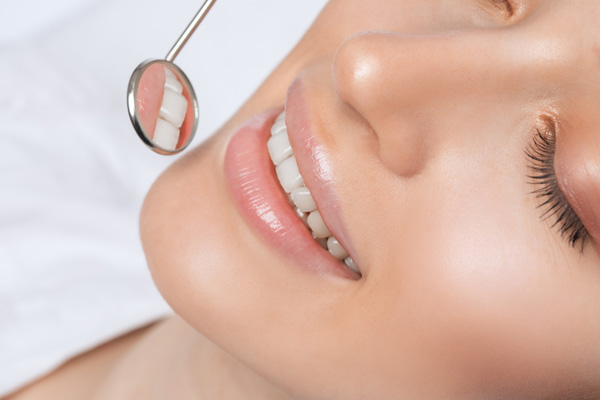What Your Dentist Wants You to Know About Adjusting to New Dentures

Adjusting to new denture can take a few weeks, but once a patient has adjusted, it is easier to eat and smile with confidence. For those who have had tooth loss corrected through dentures, it can take some time before things feel normal inside the mouth. Dentures feel and function differently than natural teeth. They often irritate the gums and leave wearers struggling to figure out how to adjust. Before getting overwhelmed with the different feelings that dentures present when speaking or eating, remember this advice from a dentist.
Discomfort will be normal
Many assume that the pain, irritation, and discomfort felt in the early days and weeks of wearing new dentures is not normal. It can take an average of 30 days before fully adjusting to the sensations and pressure of wearing new dentures, and it is important not to rush trying to get back to normal. The soft tissues and gums need to get used to the feeling of constant contact with the base of the dental appliance. Even though there is a layer of protective cushioning on the bottom of the dentures, there may be some discomfort when chewing or speaking.
The gums will need time to heal, and the jawbone will learn to adjust to eating without deep bone pressure. However, as there are no teeth to continually stimulate the jawbone and prevent bone loss, the jawbone will eventually shift position, and discomfort can result. This is why dentures may periodically need to be adjusted by a dentist.
Readjust as necessary
Your mouth has to become accustomed to holding the dentures into place. The prosthetics may feel loose in the first several weeks. In fact, you may find that they pop out of place now and then. Stay patient with the dentures and remind yourself that this phase will not last. Instead, just reposition with care and carry about your day. Do not forget to attend your follow-up appointments to ensure that you do not need further adjustments.
Alleviate pain and discomfort
While discomfort is normal when you have dentures for the first time, there are methods to alleviate the pain and discomfort. Give your gums a massage to increase blood flow to the area. As circulation increases, swelling decreases. Whenever you remove the dentures, swish warm salt water in your mouth. Not only does salt water reduce inflammation, but it can reduce soreness too. There are also topical creams available to relieve soreness. To help soothe the gums, apply aloe vera to the dentures.
Dietary habits need to change
In addition to adjusting to new dentures by knowing what to expect, it is important to understand the impact dietary choices may have on the adjustment process. The new equipment may cause some embarrassment or frustration, as it is possible to accidentally scrape the gums, bite the tongue, or pop the dentures out of the mouth while learning how to chew with the false teeth. It may be helpful to practice at home until a level of confidence has been developed. A dentist may also make the following recommendations in order to make things more comfortable during the transition period.
Select soft foods
To give the mouth an opportunity to move the mouth comfortably with new teeth, start with soft foods. Foods like pudding, applesauce, or mashed potatoes will not put too much pressure on the gums, which allows them to heal while the mouth and jaw get into the routine of eating with dentures in place. While soups and broth are soft foods, dentures can make the gums more sensitive to hot and cold sensations and should be eaten carefully.
Bite carefully
Use small bites when advancing to tougher foods. A safe practice is to start chewing with the back teeth rather than the front teeth. Biting into the wrong foods with the front teeth can cause the dentures to shift across the back teeth. Small, bite-sized pieces in the back of the mouth or along the sides put more even pressure on the jaws and dentures.
Conclusion
Dentures do function similarly to your natural teeth. However, there is still a learning curve. Understanding that there is a period of adjustment can help you remain patient and stick with the process. These tips for adjusting to new dentures can spare a patient from extreme discomfort or worry. For more help with denture-related concerns, schedule an appointment with a dentist.
Request an appointment here: https://www.allsmilesdentalcenter.com or call All Smiles Dental Center at (210) 714-7429 for an appointment in our San Antonio office.
Check out what others are saying about our dental services on Yelp: Denture in San Antonio, TX.
Recent Posts
For patients with dentures, proper denture care is necessary for preserving the life of these appliances and keeping them looking clean and attractive. Like natural teeth, dentures are prone to a buildup of plaque and food debris. With the right care, these prosthetic teeth will retain their shape and look their best.Just like natural teeth,…
Dental patients with multiple missing teeth can benefit from implant supported dentures to restore their smiles and facilitate chewing. This state-of-the-art teeth replacement treatment is also highly effective for improving oral health.This popular teeth replacement option combines the support, stability, and comfort of implants with the affordability of traditional dentures. In addition, patients may benefit…
Having missing teeth can make normal tasks such as eating or speaking difficult, but there are several tooth replacement options available to allow you to restore function and improve the appearance of the mouth. Learn more about what alternatives are available to patients and the potential benefits of each method.Depending on the situation and how…
Dental implants are often used to replace individual teeth but can also offer multiple teeth replacement options. Such options include cantilever bridges, implant-supported bridges and implant-supported partials.Depending upon the condition of the person's gums and jawbone, a single implant can sometimes be placed to support two adjacent teeth. More commonly, multiple implants are used to…


